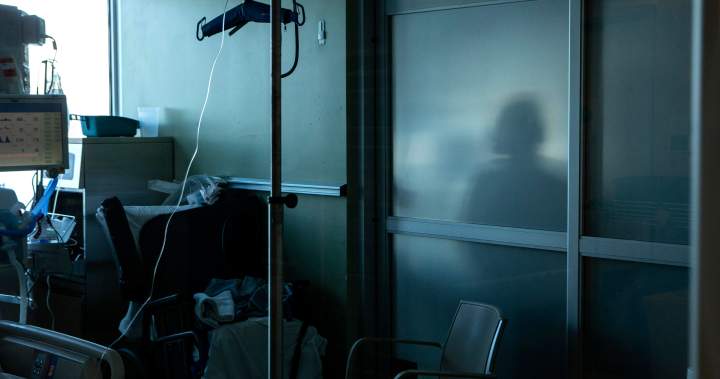In nearly 30 years as a palliative care physician, Dr. Nathalie Allard has provided end-of-life care in busy hospital hallways, and consulted with families with only a curtain separating them from sick people screaming or vomiting on the other side.
On Thursday, she attended the opening of a brand-new palliative care facility northeast of Montreal that represents the kind of place where she wants to work and, one day, to die.
“It’s my workplace — and my final resting place, probably,” she said cheerfully while giving a tour. “Me, I’m going to die.”
Located in St-Charles-Borromée in the Lanaudière region, the $8 million facility has 10 rooms for palliative care patients near the end of their lives, as well as outpatient services to help people with terminal diagnoses live more comfortably. It also has a dedicated unit for medical assistance in dying, with room that families of up to 20 can book for a loved one’s last moments.
Health care providers say the space meets a growing need for end-of-life services including MAID, which is involved in more than one out of ten deaths in Lanaudière.
Held under a white tent with speeches, cocktails and artfully scattered flowers on the ground, the launch event felt more like party than a building opening.
While Allard focuses on palliative and doesn’t perform MAID herself, she says the end of a life, including doctor-assisted death, can be a celebration too.
“We celebrate weddings, we prepare for a wedding,” she said. “I won’t disappoint you, but we’re all going to die. So why not prepare for this great moment and celebrate this great moment which is our death?”
By necessity, Lanaudière is developing expertise in dying.

Get daily National news
Get the day’s top news, political, economic, and current affairs headlines, delivered to your inbox once a day.
The fast-growing area, known for outdoor scenery and picturesque towns, counts a higher-than-usual proportion of older adults, and the province’s highest rate of medically-assisted death.
More than 5,700 people received medical assistance in dying in Quebec between April 1, 2023 and March 31, 2024, according to the province’s end-of-life commission. The number of MAID deaths has increased every year, though the rate of increase had slowed, the most recent annual report said.
Quebec has the highest proportion of MAID deaths in Canada, at 7.3 per cent. In Lanaudière’s health region, it’s 12.4 per cent.
Dr. Louis Daigle, a physician and MAID provider in Lanaudière, says the rising demand for MAID has put pressure on resources. He administers MAID about 80 times a year — sometimes up to four times a day.
He said it’s not clear why people in Quebec choose MAID at higher rates than elsewhere in the world.
“The answer isn’t simple—many factors are involved, including personal and social values, religious aspects, multiple diagnoses with predictable and unpredictable death, and high social acceptability,” he said in a written interview.
However, he says the popularity doesn’t surprise him, “given the peaceful nature of the death and the suffering spared to both patients and their families.”
Lanaudière is an outlier not only when it comes to MAID, but also to population aging. François St-Louis, who represents the Joliette region in the provincial legislature, said his region is “10 years ahead” of the rest of the province when it comes to aging.
St-Charles-Borromée, where the new facility is located, ranks fourth on a list of Canadian cities with the highest proportion of citizens over the age of 85, with eight per cent.
In Lanaudière as a whole, demographic projections published by the local health authority suggest the population of people 75 and older could grow 51 per cent between 2025 and 2035, compared to 40.8 for Quebec overall.
In 2023, new rules came into effect that stated that palliative care homes must include MAID in the services they offer. It was part of an expansion of access that also paved the way for people suffering from degenerative diseases such as Alzheimer’s to make advanced MAID requests while still able to consent.
Sonia Bélanger, the minister responsible for seniors, told reporters that Quebec has the highest life expectancy of any province, and more than two million people over 65. That means a growing need for all types of services, including seniors homes, home care, palliative care and MAID, she said.
“You’ll see in the coming years, there will be more and more medical assistance in dying that can be offered in different palliative care homes, but also at home and also in hospital centers,” she said.
Event organizers describe the new palliative care facility as a first in Quebec — a facility built mostly with private money, which has been given over to the public health authorities to run. They suggested it could be a model for others.
The room dedicated to MAID is able to host large gatherings, and includes a fridge and counters, speakers to play music and comfortable armchairs in addition to the medical bed. Next door is a lounge to give families a quiet space to process and grieve. Allard says the families will be offered spiritual services and support from staff, including a cook who can help make an adapted final meal for the recipient. Services are free, she added.
Philippe Ethier, the head of the local health authority, or CISSS, for Lanaudière, says growing old doesn’t always mean getting sick.
However, he said the health authority has been adapting to meet the realities of aging, whether it’s through expanding hospitals, opening new long term care facilities and seniors homes, or creating new services for seniors who live in the community. MAID, he said, is part of a “continuum of care.”
“The end of life is part of life” he said. “It’s a sad event, but it’s an event that happens. The more we can have facilities that favour well-being, favour serenity, and we can plan, it’s part of the service we offer.”
Read the full article here
